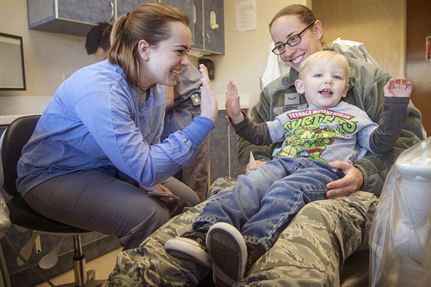Overview
Regular dental checkup for kids is important. It is a part of preventive dental care. Preventive dental care can reduce the chances of many dental problems. So, every parent should care about their child dental care needs.
During a dental checkup, the dental practitioner or hygienist can clean your child’s teeth and evaluate your child’s risk of the cavity. The exam would possibly embody applying a sealant or fluoride to cut back the chance of dental caries. A dental exam for kids may also embody dental X-rays and it may include different diagnostic procedures.

The dentist or hygienist can likely discuss your child’s diet and oral hygiene habits and demonstrate correct brushing and flossing techniques. Different topics would possibly embody preventing oral problems or, for adolescents, the health risks related to tobacco, drug abuse, and oral piercings.
When to have a dental exam and what you can expect
Various factors would possibly determine how often your kid needs to have a dental exam, including age, health, and risk of dental caries. think about these general guidelines:
Ages six months to one year
The American Academy of Pediatric Dentistry and the American Dental Association suggest planning a child’s 1st dental exam once the Primary tooth (Milk tooth) erupts and no later than the first birthday.

The dental practitioner or hygienist would possibly place your kid on a table or examination chair. They may also ask you to hold your kid on your lap during the examination on
- Evaluate your child’s oral hygiene and overall health, drinking and eating habits, and risk of caries.
- Remove stains or deposits on your child’s teeth by gently scrub with a wet toothbrush or wet material.
- Demonstrate correct cleanup techniques
- Assess what quantity fluoride your kid is obtaining through diet and use of oral hygiene product like toothpaste.If necessary, prescribe a fluoride supplement or apply a topical fluoride treatment to your child’s teeth
- Look for sores on your child’s tongue, within the cheeks, and on the roof of the mouth
- Evaluate the impact of habits like pacifier use, thumb sucking, and tongue thrusting.
Toddlers, school-age kids and adolescents
The American Academy of Pediatric Dentistry recommends scheduling regular dental checkups, with the most common interval being every six months. However, the dental practitioner may suggest fewer or more-frequent visits counting on your child’s risk factors for oral health issues.

During every regular health check, the dental practitioner or hygienist can evaluate your child’s oral hygiene and overall dental health, drinking and eating habits, and risk of dental caries. Besides scaling (clean up) your child’s teeth, the dental practitioner or hygienist might:
- Take digital dental X-rays or, if necessary, do different diagnostic procedures
- Apply sealants — It is a thin, protective plastic
coatings — to permanent molars and other back teeth vulnerable to decay. - Repair cavities or tooth defects
- Look for orthodontic problems such as how your child’s upper and lower jaw occludes together. They will also check there any crossbite in posterior teeth.
- Counsel your kid concerning the impact of thumb sucking, jaw clenching or nail-biting.
- Recommend pre-orthodontic treatment, like a special mouthpiece, or treatment, like braces, to straighten your child’s teeth or alter the bite.
As your kid gets older, dental exams may also embody guidance concerning the oral health risks associated with:
- Drinking sweet beverages
- Smoking
- Chewing tobacco
- Eating disorders
- Oral piercings
- Not wearing a mouthguard during contact sports
The dental practitioner may also discuss the possible removal of your child’s wisdom teeth (third molars). It can be removed at a suitable age, typically at age sixteen.
Your dentist can
Your kid can receive an intensive cleanup of the teeth and gum line. It will help to stop bad breath, cavities, and gum disease.
Your dentist can fully examine the teeth, gums, and mouth. By doing this the dentist will examine for any signs of disease.
Some appointments could embody x-rays. The dentist use x-rays to see for any unnoticeable oral problem like impacted teeth, jawbone injury, or decay between teeth.
Dental X-ray

A dental X-ray permits the dental practitioner to visualize detailed pictures of specific sections of your child’s mouth. It will help in the diagnosis of problems not visible during the dental exam
X-rays are not usually required at each dental visit. The dentist can talk to you the necessity for X-rays based on your child’s age, oral health and risk of disease.
Radiation exposure from dental X-rays is low, particularly with digital X-rays — however, ask the dental practitioner if you are concerned.
